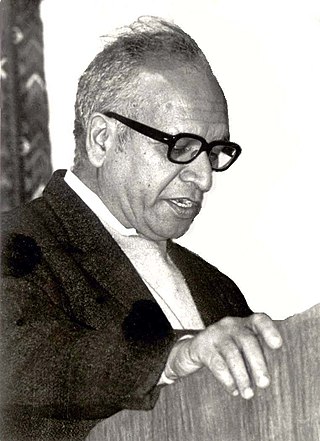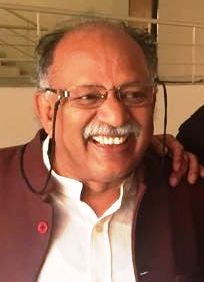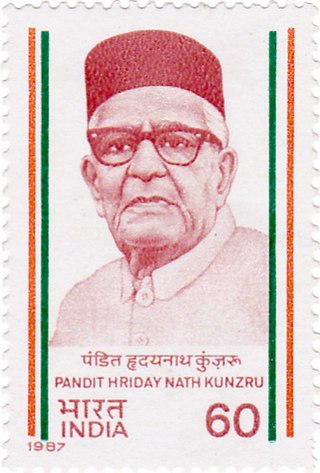
Bipan Chandra was an Indian historian, specialising in economic and political history of modern India. An emeritus professor of modern history at Jawaharlal Nehru University, he specialized on the Indian independence movement and is considered a leading scholar on Mahatma Gandhi. He authored several books, including The Rise and Growth of Economic Nationalism.

Jawaharlal Nehru University (JNU) is a public major research university located in New Delhi, India. It was established in 1969 and named after Jawaharlal Nehru, India's first Prime Minister. The university is known for leading faculties and research emphasis on social sciences and applied sciences.

Deepak Kumar was a professor of History of Science and Education, at Jawaharlal Nehru University, New Delhi, India. Kumar lectured at numerous universities within India and abroad, held visiting fellowships at the universities of Cambridge, London, Leiden, The Smithsonian Institution, etc. and has also taught at Wisconsin University, Madison, USA, and York University in Toronto, Canada.
B. S. Chimni is a legal scholar and academic who is presently distinguished professor of international law member at Jindal Global Law School. His areas of expertise include international law, international trade law and international refugee law. He has been chairperson of the Centre for International Legal Studies at Jawaharlal Nehru University, New Delhi. He had a 2+1⁄2-year stint as vice chancellor of the West Bengal National University of Juridical Sciences. He has been a visiting professor at the International Center for Comparative Law and Politics, Tokyo University, a Fulbright Visiting Scholar at Harvard Law School, visiting fellow at Max Planck Institute for Comparative Public Law and International Law, Heidelberg, and a visiting scholar at the Refugee Studies Center, York University, Canada.
V. S. Mani was an Indian legal scholar. He was the founder and director of Gujarat National Law University and an expert in the field of public international law. He was also the founder and director of the Seedling School of Law and Governance at Jaipur National University in Rajasthan, India. He died on 22 August 2016.
Moonis Raza was an Indian academic administrator, regional planner and geographer of International repute. He was born in Ghazipur, UP, India and educated at The Aligarh University, India. He was the older brother of Prof Mehdi Raza, Head and Prof of Geography and Rahi Masoom Raza, a poet, novelist, Indian Film Industry lyricist and screenplay & dialogue writer. He was married to Dr. Prof Shehla M Raza and had 5 children.

Hridya Nath Kunzru was an Indian freedom fighter and a public figure. He was a long-time Parliamentarian, serving in various legislative bodies at the Provincial and Central level for nearly four decades. He was a member of the Constituent Assembly of India (1946–50) that drew up the Constitution of India. He was also keenly interested in international affairs and co-founded the Indian Council of World Affairs and the Indian School of International Studies.

The Asian Relations Conference was an international conference that took place in New Delhi from 23 March to 2 April, 1947. Organized by the Indian Council of World Affairs (ICWA), the Conference was hosted by Jawaharlal Nehru, then the Vice-President of the interim Viceroy's Executive Council, and presided by Sarojini Naidu. Its goal was to promote cultural, intellectual and social exchange between Asian countries.
Tan Chung is an authority on Chinese history, Sino-Indian relations and cultural exchange. He has been a doyen of Chinese cultural studies in India for nearly half a century.

Satish Chandra was an Indian historian whose main area of specialisation was medieval Indian history.
Prof. Muchkund Dubey is a Former Ambassador and Former Indian Foreign Secretary, the administrative head of the Indian Foreign Service, Government of India.
B. R. Deepak is an Indian sinologist. He is the first Indian to receive China's highest literary award.
Mahendra P. Lama is an Indian professor and a development economist who was the pro-vice chancellor of IGNOU and the founding vice chancellor of Sikkim University in India. At the age of 45, he became the youngest vice chancellor of a National Central University in India. He is presently a senior Professor in the School of International Studies, Jawaharlal Nehru University, New Delhi; Chief Economic Adviser in the Government of Sikkim and Member of the Eminent Persons Group on Nepal-India Relations appointed by the Prime Ministers of India and Nepal.

Pushpesh Pant is an Indian academic, food critic and historian. He retired as a Professor of International relations from Jawaharlal Nehru University, Delhi. He is one of India's leading experts on International Relations as well as Indian cuisine, and as a columnist has written for a number of major publications like Forbes, Open, Outlook, Times of India and The Tribune.
The School of International Studies is an academic institution created in 1955 which merged with the Jawaharlal Nehru University in 1970. It was founded by Pandit Hriday Nath Kunzru, Prof. A.Appadorai and Professor M.S. Rajan, under the auspices of the Indian Council of World Affairs. In the 15 years of its existence, it came to be noted as the leading institute of research in the area of International Relations and Area Studies in India. Many of its former faculty and students went on to occupy academic positions in other universities and research institutes across the country.

Professor Anvita Abbi is an Indian linguist and scholar of minority languages, known for her studies on tribal languages and other minority languages of South Asia. In 2013, she was honoured with the Padma Shri, the fourth highest civilian award by the Government of India for her contributions to the field of linguistics.
Sudhir Kumar Sopory is an Indian educationist, plant physiologist, scientist and former vice chancellor of Jawaharlal Nehru University, New Delhi. He is known to be the first to purify a protein kinase C activity from plants and is credited with the identification of topoisomerase as a substrate of protein kinase C. He is an elected Fellow of several major Indian science academies and The World Academy of Sciences (TWAS) and is a recipient of many honours, including the 1987 Shanti Swarup Bhatangar Prize, the highest Indian award in the science and technology categories. The Government of India awarded him the fourth highest civilian honour of the Padma Shri, in 2007, for his contributions to science and technology.

Valerian Rodrigues is an Indian political scientist. He is known for his influential work on Babasaheb Ambedkar, and for his formulations of themes in Modern Indian Political Thought. Rodrigues has made substantial contributions to the debate on the working of the Indian Parliament, constitutionalism in India, and agrarian politics in India. As a Professor at the Centre for Political Studies at Jawaharlal Nehru University (JNU), New Delhi, he was popular for his lectures on Indian Political Thought and Intellectual History, and critically reading the same through political concepts of modernity, secularism and nationalism. Before joining JNU, Rodrigues taught at the Department of Political Science at Mangalore University, Karnataka, India.

Namvar Singh was an Indian literary critic, linguist, academician and theoretician. He received his doctorate degree from Banaras Hindu University where he also taught for some time. He served as a professor of Hindi literature in several other universities. He was the founder and first chairman of Jawaharlal Nehru University's Centre of Indian Languages and continued to remain as a professor emeritus after his retirement in 1992.
The History of Indian foreign policy refers to the foreign relations of modern India post-independence, that is the Dominion of India (from 1947 to 1950) and the Republic of India (from 1950 onwards).










